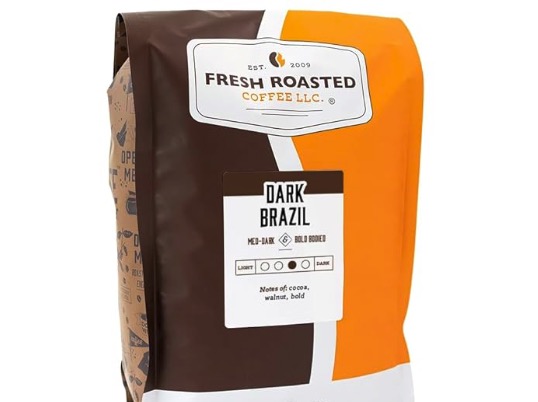Coffee, Orange Juice Prices Would Soar on Capricious Brazil Tariffs
By Reuters | 10 Jul, 2025
The 50% tariffs on imports from Brazil announced earlier this week would essentially eliminate massive coffee, sugar and orange imports from that nation.
U.S. consumers face sharp price rises on food staples like coffee and orange juice if the Trump administration sticks to its plan to slap 50% tariffs on all imports from Brazil, traders and experts said on Thursday.
U.S. President Donald Trump launched new tariffs on Wednesday which included raising duty on Brazilian imports to 50% from 10%, effective August 1, despite the U.S. having a $7.4 billion trade surplus with Brazil, according to U.S. Census Bureau data.
In terms of agricultural commodities, Brazil's produces nearly half the world's arabica coffee and is by far the world's largest orange juice producer, accounting for 80% of global exports, industry data shows.
It is also the world's top sugar producer, but does not ship significant volumes to the U.S.
"With (U.S. sugar) consumption at 11.185 million tons, a 50% increase on 312,000 tons of (Brazil) sugar shouldn’t have a large impact. The bigger impact will be in coffee and orange juice. I’m thinking Acai berries as well," said sugar analyst Michael McDougall, pointing out that Trump may yet row back on his plan.
The overwhelming majority of U.S. Acai imports come from Brazil, the world’s largest producer, according to a report by Grand View Research.
U.S. Commerce Secretary Howard Lutnick said last month during a Congress hearing that some natural resources that are not available in the U.S., such as tropical fruits and spices, could be exempt from tariffs, depending on negotiations with the countries producing and exporting them.
"I don't think it would be economically feasible to sell Brazilian coffee to the U.S. with the 50% tariff. Let's see how this will evolve, but it would be very complicated," said the Brazil head of a major global commodities trader.
Around a third of the coffee consumed in the U.S., the world's largest drinker of the beverage, comes from Brazil, which has in recent years been shipping about eight million 60 kg bags a year there, according to industry groups.
More than half of the orange juice sold in the U.S. comes from Brazil meanwhile.
The U.S. has become more dependant on orange juice imports in recent years due to a sharp decline in domestic production, particularly in Florida, due to the 'citrus greening' crop disease, hurricanes and spells of freezing temperatures.
A report issued by the U.S. Department of Agriculture earlier this year forecast the U.S. orange harvest would hit an 88-year low in the 2024/25 season while production of orange juice would slump to a record low.
Brazil also exports a modest amount beef to the U.S. and the tariff has been welcomed by U.S. cattle producers.
"We fully support this tariff on Brazil. Brazil’s exports (have) contributed to the shrinking of our U.S. cattle industry. We need to rebuild and reduce our nation’s dependency on imported food. This is a step in the right direction," said R-CALF USA.
In terms of energy, Brazil is the world's second largest producer of the cane or corn-based biofuel ethanol.
The South American country produced some 35 billion litres of ethanol in 2024, but exported less than 6%, of which only some 300 million litres went to U.S., according to a report from BTG Pactual.
Energy major Shell is exposed to Brazil's biofuel market via Raizen, a joint venture between itself and Brazilian conglomerate Cosan, while BP is exposed as it now has full ownership of Brazilian sugar and ethanol producer BP Bunge Bioenergia.
In a letter to Brazilian President Luiz Inacio Lula da Silva setting out his tariff plan, Trump criticised what he saw as Brazil's attacks on free elections, social media platforms and digital trade activities of U.S. companies.
(Reporting by May Angel and Marcelo Teixeira. Additional reporting by PJ Huffstutter and Shadia Nasralla;Editing by Elaine Hardcastle)
Around a third of the coffee consumed in the U.S., the world's largest drinker of the beverage, comes from Brazil, which has in recent years been shipping about eight million 60 kg bags a year there, according to industry groups.

One third of the coffee purchased in the US comes from Brazil.
Asian American Success Stories
- The 130 Most Inspiring Asian Americans of All Time
- 12 Most Brilliant Asian Americans
- Greatest Asian American War Heroes
- Asian American Digital Pioneers
- New Asian American Imagemakers
- Asian American Innovators
- The 20 Most Inspiring Asian Sports Stars
- 5 Most Daring Asian Americans
- Surprising Superstars
- TV’s Hottest Asians
- 100 Greatest Asian American Entrepreneurs
- Asian American Wonder Women
- Greatest Asian American Rags-to-Riches Stories
- Notable Asian American Professionals

